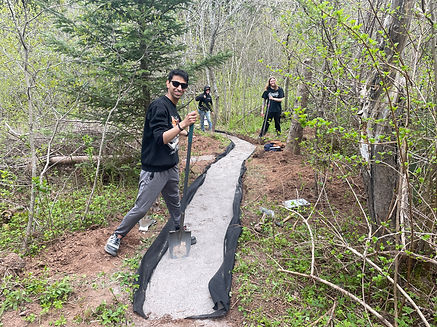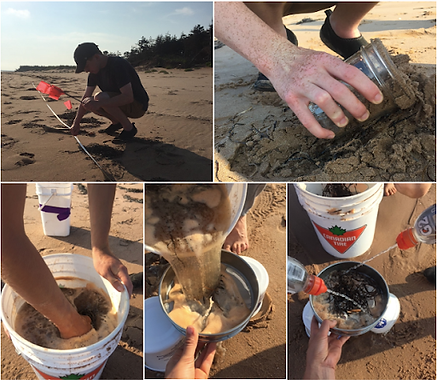
Projects
Some of the activities that we complete each year are part of ongoing projects, and others are distinct and time limited. These are some of our projects that have been completed.
Educational Trail
2017-Present
In 2017, WRTBWA was gifted a woodlot property. Since then, staff have been working hard over the years to establish an accessible trail through pruning, cutting, digging, laying mulch and gravel for paths, and building bridges. The trail faced setbacks in 2022 from hurricane Fiona damage, but continues to be developed. The trail features educational signs for various wildlife habitat instalments.

Blight Spore Project
2023-2024
.png)
WRTBWA partnered with potato farmers in the watershed to test for late blight spores by using a tool called the Spornado. This tool can collect spores from the air which can then be tested to see if late blight spores are present. This information can be used by potato farmers to determine if and when they should spray for the fungus. This monitoring program was funded and organized by the PEI AgriWatershed partnership.
Microplastics Project
2020-2022
In the fall of 2020 staff from the WRTBWA took part in a workshop hosted by Coastal Action to learn about microplastic sampling that was already being conducted around the Maritimes in areas of Nova Scotia and Newfoundland. The workshop introduced 2 methods for collecting microplastics; the first method involves collecting samples of sand from the shoreline and the second method uses a Low-tech Aquatic Debris Instrument, or LADI trawl for short, which is a device that is dragged from a boat and collects microplastics that are floating on the water’s surface. WRTBWA used both methods in the Tracadie Bay area.

Water Use Makeover Program
2016-2019

The Brackley Branch of the Winter River at a low flow on the left (July-November 2015) and a normal flow on the right (December-June 2015)
This project was launched by the Winter River – Tracadie Bay Watershed Association in an effort to provide the education and materials necessary for participants to make a lasting reduction in their water use, and thus reduction in water extracted from the Winter River watershed. This project also had a research component, to see what types of water use appliances were in use, and the level of household water savings that would be realistic in our community. With more groundwater remaining for ecosystem health, all living things in the watershed benefit from these efforts
Save Some Water for Me, Please
2012
.jpg)
In 2012, Winter-River Tracadie Bay Watershed Association partnered with the Charlottetown Water & Sewer Utility to develop a series of water conservation commercials. These commercials encourage residents and business owners in Charlottetown to reduce their water use through simple changes in their day-to-day water use habits such as using low-flow showerheads and fixtures, using dishwashers when they are full, and using rain barrels for outdoor water use.

